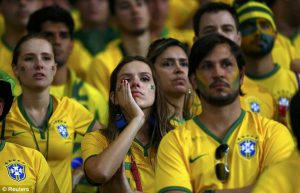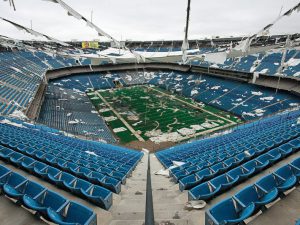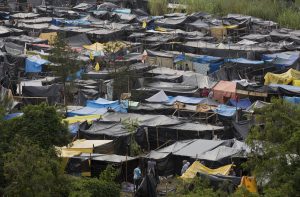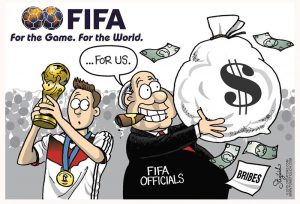The Corruption of FIFA
William Agentowicz
The Corruption of FIFA
The 2014 World Cup showcases a classic and modern example of how FIFA neglects an area and uses it for the organization’s own gain. With millions of dollars going into the pockets of FIFA and football associations while millions of people suffer, the corruption permeating all throughout the footballing world shifted to the forefront and became ever more apparent. But in order to understand how FIFA became this misguided and distrusted organization, the seed of corruption must be understood.
As the focus of Goldblatt’s “The Ball is Round: A Global History of Football” shifts to Joao Havelange, FIFA takes on the role of marketing soccer to the world. Television sets were becoming more widespread and allowed more people to receive the full experience without being at the stadium. This created a new market, through TV rights and sponsorship, for Havelange and FIFA to move into. These opportunities proved to be extremely lucrative because of the insanely high selling price, which was possible because of the ingrained appeal and widespread following soccer already had around the world. FIFA could sell the TV rights or have a product become the “official” product of the World Cup. With almost no costs associated with these types of products for FIFA, the revenue coming in was nearly all profit. But instead of using the vast amounts of money to further soccer’s development around the world, Havelange and his cohorts used this money to live a lavish lifestyle as they watched the game they were supposed to be governing. At the 1982 World Cup in Spain, the expenses of FIFA executives were $3 million more than the cost of bringing all 24 teams to Spain and house them for the duration of the tournament. This kind of activity has been happening ever since, with no true accountability for a person’s actions, despite minor slaps on the wrist after they and are long gone. By acting so obviously with their own interests in mind, it raises the question of how FIFA can do this and never have to pay for their actions.

Part of the reason FIFA’s actions go largely unpunished is because they are not held accountable by any institutional governing body except themselves. Although FIFA is incorporated in Switzerland, Swiss authorities did not do much to curtail their actions until 2015, when 14 people, including 9 FIFA officials were arrested on suspected bribery and money laundering. Another aspect of FIFA’s corruption has to do with the benefit it brings to Switzerland. By going in and properly regulating FIFA, Switzerland run the risk of making a very powerful enemy who can negatively impact their own national team and national league, which would hurt Switzerland in the long run despite appearing beneficial in more immediate terms. Finally, countries that are members of FIFA often engage in rent seeking, which is the manipulation of policy or economic factors in order to increase profits. This has been an obvious part of the last two World Cups in South Africa and Brazil. For example, Local construction companies, are allowed to charge enormous rates for the construction of the stadiums used for matches, which lines the pockets of local officials who have ties to the companies involved. The stadiums are useless after the tournament, while millions of dollars in taxpayer’s money has been spent to play a few games and make corrupt officials very wealthy. In order to eliminate these problems, FIFA must be gutted and reorganized with the true goals of soccer in mind; to watch and grow the game we love.
FIFA’s Divide: Sport vs Business
FIFA’s Divide: Sport vs Business
Players and fans alike watch in horror as one of the greatest football nations in the world is utterly embarrassed on their home turf. Spectator’s emotions spiral out of control, ranging from uncontrollable tears to a perplexed silence. Player reactions are like those of the fans, deflating like the air out of a balloon as the score continues to mount. This was the scene of the semi-final of the 2014 World Cup between Brazil and Germany in Belo Horizonte, Brazil. The Brazilian national team was subject to their worst loss in history and their first loss on home soil in a competitive game in 39 years after the 7-1 thrashing by Germany. The historic result ended an emotional and important tournament for Brazil because of the rare opportunity to win the World Cup while playing in front of their own fans. The heart-wrenching loss is an event fans all around the world will remember for years to come. Brazilian fans put all their pride, hope, and passion into their national team, only to be left with agonizing pain.
Germany would go on to beat Argentina in the final to claim the World Cup and cap off what many people, including FIFA, would consider a successful tournament. And why shouldn’t they? The tournament attracted international attention with 3.2 billion people watching the tournament, 1 billion of which came from the final match alone. Over 3 million fans flocked to the stadiums around Brazil, providing the local economies with business from fans traveling, staying in hotels, and patronizing stores. Lesser mentioned nations such as Costa Rica received enormous attention as the team went on a fairy tale run out of the group stage and into the last eight teams remaining, the furthest in the nation’s history.
FIFA made about $4.8 billion in revenue from the tournament, resulting in a profit of $2.6 billion. As FIFA officials celebrate another “successful” tournament, the country of Brazil feels more pain, even after their devastating loss. The cost to host this World Cup cost Brazil about $15 billion, with meager help of $553 million from FIFA to help build the extravagant stadiums, roads, and airports. Infrastructure projects forced 170,000 people to leave their homes and relocate to makeshift huts that leave the already poverty stricken people without electricity or running water. In addition, FIFA only allowed licensed products from their own sponsors to be sold in the vicinity around the stadium, preventing locals from selling food, drinks, and memorabilia to match-day fans. With FIFA limiting how Brazil’s economy can recoup the huge sums of money spent to host on the World Cup, it is no surprise that citizens are left with a real average income lower today than it was before the tournament two and a half years ago.
The stark contrast between perception and reality of the 2014 World Cup shows FIFA’s business model is nothing more than a way to exploit our love of the game. Personally, this chasm between what is happening on the field and the pockets of FIFA executives has tainted how I feel about international football. Don’t get me wrong, I would spend tons of money if the World Cup came to American soil to see my team in the spotlight, but the thought about what FIFA did to the people in Brazil would always be present in the back of my head. For FIFA to solve this problem, major reform needs to happen. A long history of corruption haunts the organization and the newest president doesn’t seem any different. FIFA needs a major change in leadership, crucial transparency reform, and most importantly, support for nations after the cameras are gone. Bridging that divide might not come easily to FIFA, but it will allow fans just like myself all around the world to cheer, without any doubts, for their national team as they watch the game they love.
Sources:
http://www.bbc.com/sport/football/28223121
http://www.businessinsider.com/fifa-brazil-world-cup-revenue-2015-3
http://www.bbc.com/news/business-28881952







